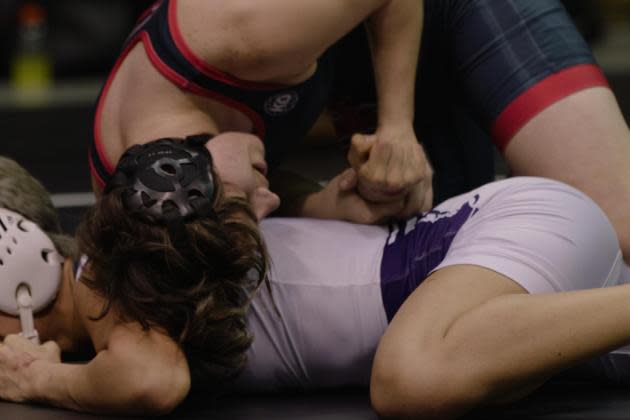‘Changing The Game’ Reveals How Conservatives Are Demonizing Trans Athletes To Score Political Points
- Oops!Something went wrong.Please try again later.
- Oops!Something went wrong.Please try again later.

When wrestler Mack Beggs stepped onto the mat to compete during his days as a high schooler in Texas, he not only faced the opponent in front of him, but often a raft of adversaries in the stands. They booed him and hurled invectives.
“I do think people hate me,” Mack says in the Emmy-nominated documentary Changing the Game. The reason? “There was a huge uproar and controversy with me being trans.”
More from Deadline
Beggs found himself twisted into knots — not by another wrestler, but by a state imposing restrictions and regulations on the activities of trans athletes. Beggs wanted to compete against boys, but Texas refused and would only allow him to wrestle girls. When he did wrestle girls, crowds rained down abuse.
Beggs said he tried to tune that out and keep focused on the match.
“I was just like, why are you being malicious? I’m not going to feed into your negativity,” he recalls. “I know that whoever’s on the end of that mat, if they want to go against me, then it’s game on. It’s a sport and I love the competitiveness of it.”
The Hulu documentary, directed by Michael Barnett, profiles three trans high school athletes: Beggs in Texas, skier Sarah Rose Huckman in New Hampshire, and sprinter Andraya Yearwood in Connecticut. Each one had to navigate a political climate that is becoming more and more hostile to trans athletes.
In one tense moment in the film, Yearwood runs a race and is promptly accosted by an adult woman. “That is so unfair! It is totally a male biology!” the woman hollers within Yearwood’s hearing. “Women did not fight for decades for Title IX, for decades to have equal rights, to have them taken away by foolish policies that are discriminatory against girls and women. It has made a mockery of girls’ sports; it has made a mockery of women’s rights. It is a total sham.”
Yearwood heard the woman but chose not to engage with her.
“I actually remember that scene quite well,” she says. “I remember being in the moment and hearing her say it and at first it was kind of like, ‘Is this really happening? Is she really saying this and I’m right here?’ I was thinking, ‘Is it really worth my time, my effort, to respond to you, when what is that going to do?’”

Hulu
Barnett remains troubled by the aggressive nature of the woman’s outburst.
“I was sitting right there with a camera. It didn’t feel like hateful rhetoric to me — it felt like assault,” he says. “It went past the line of whatever free speech is. It felt like, to me being there front and center, that this woman was assaulting a minor. She was at the event simply to do that. Didn’t have a child in the race.”
The rhetoric has been amped up by conservative politicians who have discovered they can score points by raising alarms over trans people in sports. At the Supreme Court confirmation hearings of Judge Ketanji Brown Jackson in March, Sen. Marsha Blackburn, R-Tenn., pressed the judge to address trans swimmer Lia Thomas, who won an NCAA women’s title. The senator wanted to know what message allowing Thomas to compete sent to “girls who aspire to compete and win in sports”. The senator proceeded to answer her own question: “I think it tells our girls that their voices don’t matter. I think it tells them that they’re second-class citizens.”
Similarly, at a speech in Washington on July 26, former President Trump directed ridicule at trans athletes to rile up a crowd. “By the way,” he told his supporters, “we should not allow men to play women’s sports. It’s so disrespectful to women.” Apparently pleased by the audience applause, Trump went on to muse, “I’d be the greatest women’s basketball coach in history. I don’t like LeBron James; I like Michael Jordan much better. But, I’d go up to LeBron James… I’d say, ‘LeBron, did you ever have any desire to be a woman? Because what I’d love you to do is star on my team.’”
Alex Schmider, an executive producer on the film and GLAAD’s director of transgender representation, calls this kind of rhetoric opportunistic and cynical.
“The attention and focus on transgender athletes is a coordinated and very well-funded attack by politicians and organizations that have understood and done message testing that a lot of people just don’t personally know trans people in their lives,” Schmider says. “They have really centered in on this issue of sports because they realize that there is a lot of misinformation and there’s a lot of fearmongering and ability to capitalize on people’s ignorance and fears and then activate people around that.”

Hulu
Schmider sees this in a larger context. “The attacks on trans kids in sports is not disconnected from the overturning of Roe v. Wade. It is not disconnected from trying to rewind and overturn marriage equality. All of this is concentrated and connected to ways that certain people and political systems want to continue regulating certain bodies and controlling certain bodies.”
Schmider adds that this political strategy can only be effective “if you don’t see trans kids and trans people as human.”
And that’s where Changing the Game comes in. Its very purpose is to put a human face on young trans athletes. Huckman, the high school skier, says in the film, “I’m a normal human being. I’m not some monster people make transgender people out to be.”
In the last two years, 18 states have enacted laws or imposed rules that restrict or ban trans people from participating in organized sports. Late last year, Republican Gov. Greg Abbott of Texas signed a law that requires the state’s K-12 students to participate on sports teams according to the sex listed on their birth certificate, not their gender identity. A bill that failed in Minnesota called for criminal penalties against transgender girls who participated in girls’ sports.
Clare Tucker, producer of Changing the Game, accuses politicians behind those efforts of not doing their homework.
“It’s wild to me that people are going to legislate, create laws, with zero research. ‘I’m not even going to meet a trans person. I’m not even going to do a day of research, a week of research, a month.’ It’s just bonkers.”
There is no official tally of trans athletes competing in high school and college, but the number is certainly small. “No more than five students currently in Kansas, nine in Ohio over five years,” according to an Associated Press investigation last year. The AP reached out to lawmakers in 24 states who had proposed legislation restricting trans participation in sports, “Yet in almost every case, sponsors [of bills] cannot cite a single instance in their own state or region where such participation has caused problems.”
Beggs puts it this way: “I feel like this issue is being politicized by the United States, some people preying on people’s prejudices and fears.”
“There’s this media narrative that trans people are just dominating sports and that’s simply not the case,” Schmider says. “There’s this skewed and false mental template that trans people are always winning in sports because those are the only stories we hear. People only have a problem with trans athletes when they’re winning.”
Huckman, who came out as trans in seventh grade, competed at a high level in skiing and track, but her results would not put her in the category of a dominant athlete. She said she took part in athletics for larger reasons than simply trying to amass ribbons, medals and trophies.
“By doing sports… I was able to express myself for who I am, especially in a team setting where it’s high competition, high stakes constantly,” she says. “Through all the hard work and drive, I was able to have just like an extra family, an extra group of people that would look after me and show me that I can be loved unconditionally.”
Changing the Game raises the question of how we assess the value of athletics at the high school level. Are sports meaningful only for those who win, or is their function also to teach sportsmanship, camaraderie, and instill discipline and pride?
“I think that Andrea’s coach really nailed it in the film,” Tucker notes, “when he says, ‘Of course, wins and losses are important, but they’re important because of what you learned from them.’”
Changing the Game, streaming now on Hulu, is nominated for Exceptional Merit in Documentary Filmmaking, a juried award evaluated on a few criteria, including the work’s capacity to “inform, transport, impact, [and] enlighten.” The film accomplishes that not only through the artistry of the filmmaking team, but the testimony of its subjects, who have stood up for their own rights and the rights of other trans athletes, and refused to be demonized without a fight.

“I am incredibly grateful,” Barnett says of the Emmy recognition. “I think it’s a real testament to these three humans sharing their courageous stories in really honest ways… the way they let us into their lives, bedrooms, living rooms, with nothing but trust.”
There is no doubt that in the near term, trans participation in sports is going to be used as a political wedge issue to stir up voters. But the athletes in Changing the Game sound a more optimistic note for the longer term, based on their experience as members of a new generation. They say in high school the hatred they received came overwhelmingly from adults, not kids their age.
“I think the younger generation realizes that we can’t keep repeating the same mistake and hopefully we can create a greater community, just more acceptance and realizing that we are all human,” Beggs says. “At the end of the day, we’re all trying to live here on Earth as best we can.”
Best of Deadline
2022-23 Awards Season Calendar - Dates For The Oscars, Emmys, Grammys, Guilds, Festivals & More
Awards Season Red Carpet Photos: Grammys, Oscars, SAG Awards & More
Sign up for Deadline's Newsletter. For the latest news, follow us on Facebook, Twitter, and Instagram.

